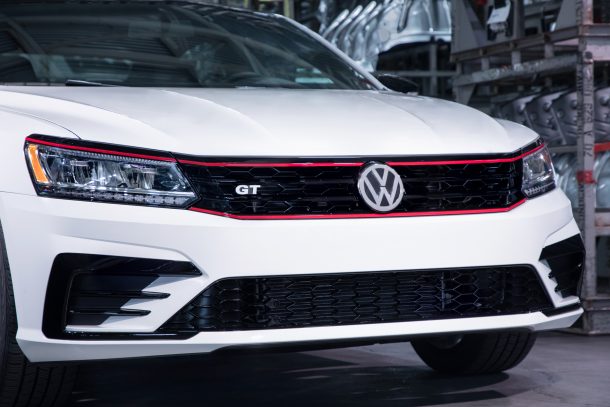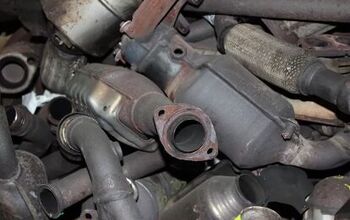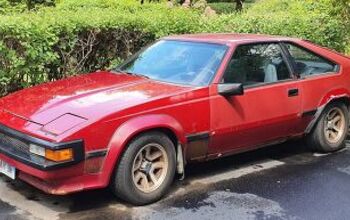With Changes Coming to the 2019 Volkswagen Passat, the Midsize Field Loses Another V6

If there was ever an engine type best associated with my youth, it was the V6. Most of my parents’ cars had ’em, the car I drove to high school (and bought not long after) had one, my friends’ cars had ’em. It was a V6-filled world — and one that now looks pretty distant in the rear-view.
Volkswagen has let slip details of its 2019 Passat, and the changes coming to the final model year of this generation means another V6 engine option drops from the automotive landscape. That leaves just two models in the non-premium midsize sedan space that still offer six cylinders beneath their hoods, and one of them is on its final pass around the sun.
As reported by The Car Connection, Volkswagen plans to trim its, er, trims for 2019, ditching the base S, high-end SEL Premium, and sportier GT, which had only arrived for the 2018 model year.
Bearing a standard 3.6-liter V6 making 280 horsepower and 258 lb-ft of torque, the GT jazzed up the Passat’s exterior with 19-inch alloys and a smattering of go-fast appearance flourishes. The same engine was optional in the SEL.
In place of these vehicles, VW plans to offer just an SE R-Line (consolidating three trim levels: R-Line, SE, and SE with Technology Package), as well as a Wolfsburg Edition as the entry-level trim. The Wolfsburg comes with 17-inch wheels, push-button ignition, faux leather seats, and a basic level of safety features ( automatic emergency braking, blind spot monitoring). Optional are 18-inch wheels and a moonroof. Moving up to the SE R-Line nets you LED lights front and rear, 18-inch wheels, upgraded audio and infotainment, and a larger suite of driver-assist features.
The changes are designed to clear the way for a new Passat promised at this January’s Detroit auto show, though VW admits the loss of the V6 isn’t likely to annoy many brand loyalists.
“It has always been a relatively small take rate,” said Mark Gillies, senior manager of product and technology communications at Volkswagen of America, in an email to TTAC.
VW introduced a new base (and now standard) engine for the 2018 model year, dropping the longstanding 1.8-liter turbo four for a 2.0-liter unit generating 174 horses and 184 lb-ft. Given that the 2019 Arteon flagship sedan also carries a standard four-banger, it’s looking like VW’s passenger car line has seen the last of the V6 engine. Gillies wouldn’t speculate on what the future holds, engine-wise.
“As for the [Passat] to be introduced in January, we will be talking about that in due course,” he wrote.
With the Passat and all-new Nissan Altima dropping their optional six-cylinders for 2019, that leaves just the Toyota Camry and Ford Fusion Sport as V6 holdouts in the midsize field, and the latter sedan is now entering its final model year. The Honda Accord dropped its 3.5-liter V6 when the current-generation sedan bowed for 2018, while the Chevrolet Malibu left its V6 behind in 2016. Hyundai, Kia, and Mazda’s V6 engines are ancient history.
[Images: Volkswagen]

More by Steph Willems
Latest Car Reviews
Read moreLatest Product Reviews
Read moreRecent Comments
- Theflyersfan I always thought this gen XC90 could be compared to Mercedes' first-gen M-class. Everyone in every suburban family in every moderate-upper-class neighborhood got one and they were both a dumpster fire of quality. It's looking like Volvo finally worked out the quality issues, but that was a bad launch. And now I shall sound like every car site commenter over the last 25 years and say that Volvo all but killed their excellent line of wagons and replaced them with unreliable, overweight wagons on stilts just so some "I'll be famous on TikTok someday" mom won't be seen in a wagon or minivan dropping the rug rats off at school.
- Theflyersfan For the stop-and-go slog when sitting on something like The 405 or The Capital Beltway, sure. It's slow and there's time to react if something goes wrong. 85 mph in Texas with lane restriping and construction coming up? Not a chance. Radar cruise control is already glitchy enough with uneven distances, lane keeping assist is so hyperactive that it's turned off, and auto-braking's sole purpose is to launch loose objects in the car forward. Put them together and what could go wrong???
- Jalop1991 This is easy. The CX-5 is gawdawful uncomfortable.
- Aaron This is literally my junkyard for my 2001 Chevy Tracker, 1998 Volvo S70, and 2002 Toyota Camry. Glad you could visit!
- Lou_BC Let me see. Humans are fallible. They can be very greedy. Politicians sell to the highest bidder. What could go wrong?



































Comments
Join the conversation
I'm a six lover (E36 M3), but VW's 2.0T variants are exceptional engines. In my Golf R the turbo 4 is smooth, quiet and powerful, with bags of torque and little turbo lag. Another version of the same engine works well in my wife's Audi Q5. The 2.0T is now the base engine in the most recent revision of Porsche's Macan. These turbo fours are compact, lightweight and more efficient in every way than the engines they supersede.
I like my '17 Jetta SE but truly wish I had sprung for a Passat. Local stores are just about giving them away and hopefully they don't go extinct before the lease is up on my Jetta... I don't give two hoots about horsepower, but torque is my friend. Modern turbo 4's seem to have plenty of low-end torque, unlike the peaky turbo engines of the 80s.